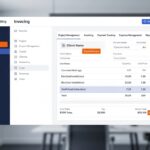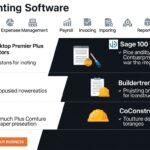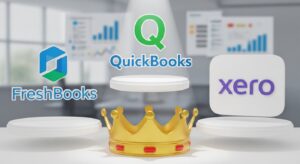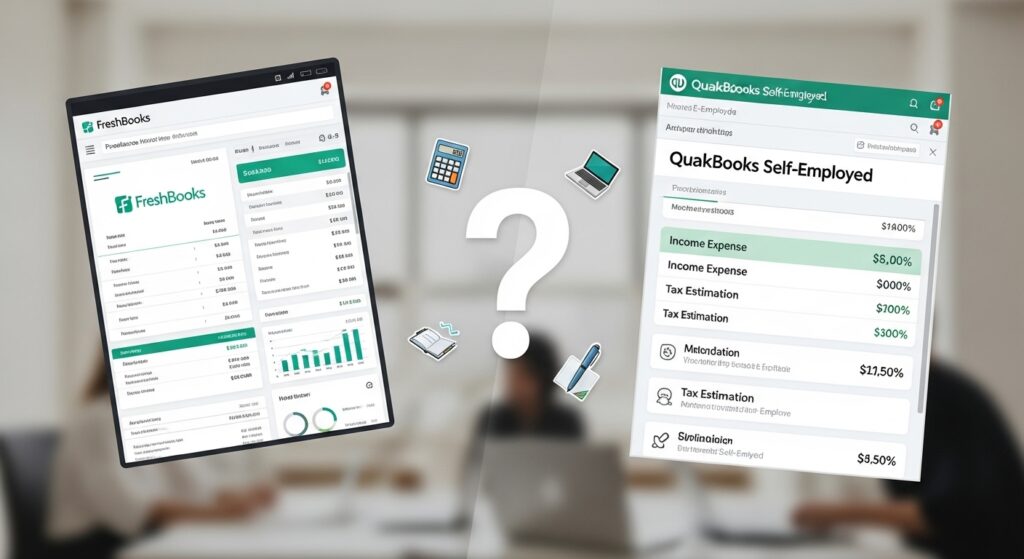
FreshBooks vs. QuickBooks Self-Employed: Picking the Best Accounting Tool for Freelancers
Being your own boss brings amazing freedom, but it also brings financial tasks. You handle the work, the clients, and the money. Keeping your finances straight is key to freelance success. This article will help you compare FreshBooks and QuickBooks Self-Employed. Both are popular choices for freelancers and small businesses. We’ll look at their main features, how much they cost, and how easy they are to use. Our goal is to give you clear facts. This way, you can pick the right software for your business needs.
Understanding Your Needs as a Self-Employed Professional
The Unique Challenges of Freelance Accounting
Freelancers face special money worries that traditional employees don’t. Your income might not be steady. One month is busy, the next is slow. This makes budgeting and saving tricky. You also need to track every penny for tax time. Invoicing clients, following up on payments, and keeping business and personal money separate are all big jobs. This is why many self-employed people need special accounting software. It helps them manage these unique challenges and stay on top of their money.
Key Features Freelancers Look For in Accounting Software
What should accounting software do for you? First, it needs to make invoicing easy and professional. You also want strong expense tracking, maybe even with receipt scanning. Time tracking is a must if you bill by the hour. Good software helps you see how projects are doing. Bank reconciliation, where you match your bank statements to your records, is also vital. And for tax season, you’ll want tools that make preparing for Uncle Sam simple. On top of all this, it must be easy to use and affordable.
The Importance of Choosing the Right Software Early
Picking the right accounting software early in your freelance journey can save you a ton of headaches. Imagine trying to sort through a year of mixed-up receipts come tax time. Starting with a good system prevents costly mistakes and wasted hours. It also gives you a clear picture of your business’s health. This clarity helps you make smart decisions, grow your business, and feel confident about your finances. Don’t wait until things get complicated; get organized now.
FreshBooks: A Deep Dive for the Self-Employed
Core Features and Functionality
FreshBooks is known for its user-friendly approach, especially when it comes to client-focused tasks. Its main strength lies in invoicing. You can create professional, branded invoices, set up recurring bills, and accept online payments easily. Expense tracking is straightforward; you can snap photos of receipts with your phone and categorize them. For those who bill by the hour, FreshBooks offers robust time tracking linked directly to projects. This makes it simple to turn tracked hours into invoices. It also has basic project management tools, letting you see project progress and team member contributions.
User Interface and Ease of Use
Many users praise FreshBooks for its clean, modern look. The interface feels intuitive, even if you’ve never used accounting software before. It’s designed to be simple, with clear menus and helpful prompts. You don’t need to be an accountant to understand how to use it. This low learning curve makes FreshBooks a top choice for creative professionals and those who want to spend less time on numbers and more time on their work. Navigating through tasks like sending an invoice or tracking an expense is usually a breeze.
Pricing Structure and Plans
FreshBooks offers several plans, usually with a free trial period. The “Lite” plan is often ideal for self-employed individuals with basic needs. It allows a limited number of billable clients. As your business grows, you can upgrade to “Plus” or “Premium” plans. These offer more clients, better reporting, and advanced features. Keep an eye out for special offers or annual discounts which can make it even more affordable. Understanding your client volume is key to picking the right plan.
Integrations and Add-ons
FreshBooks connects with many popular business tools. Need to process payments? It works with Stripe, PayPal, and others. Want to link your bank account? No problem. It also integrates with project management apps and CRMs. These connections help streamline your workflow. You can manage more of your business from one place. These add-ons extend FreshBooks’ power, making it a central hub for your freelance operations.
QuickBooks Self-Employed: Tailored for the Freelancer
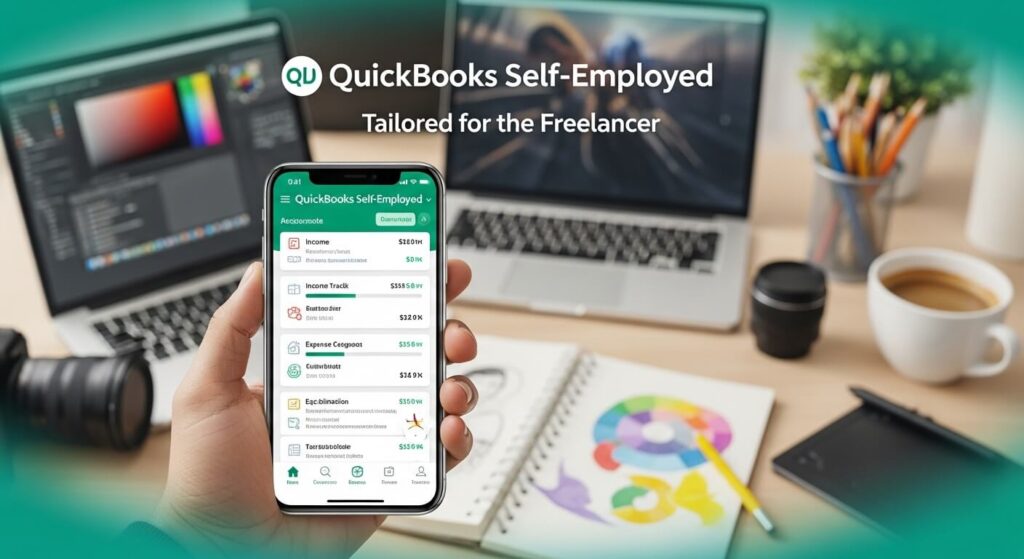
Core Features and Functionality
QuickBooks Self-Employed (QBSE) is built specifically for independent contractors and freelancers. Its stand-out feature is its focus on tax preparation. It helps you sort business and personal transactions with a swipe. Mileage tracking is also built-in, perfect for those who drive for work. You can capture receipts and categorize expenses easily. QBSE also offers simple invoicing and payment processing. Its bank reconciliation feature is designed to simplify tax deductions. It even estimates your quarterly taxes, a huge help for freelancers.
User Interface and Ease of Use
QBSE has a straightforward design. It aims to simplify tasks for people who aren’t accounting experts. The navigation is clear, often guiding you through key actions. While it’s part of the larger QuickBooks family, QBSE is much simpler than its more complex siblings. Users often find it easy to get started with the basics like tracking income and expenses. The main goal is to make tax time less stressful.
Pricing Structure and Plans
QuickBooks Self-Employed typically offers a few pricing tiers. The basic plan covers income and expense tracking, mileage tracking, and basic invoicing. Higher-tier plans may include tax features like estimated quarterly taxes and direct integration with TurboTax. Like FreshBooks, it often comes with a free trial. This lets you test drive the features before committing. Consider if you need the direct tax filing help when looking at the different plans.
Integrations and Add-ons
QBSE integrates well within the Intuit ecosystem, especially with TurboTax for seamless tax filing. This is a major benefit for many freelancers. It also connects with various bank accounts and credit cards to pull in transaction data. While its integration list might be smaller than FreshBooks, the focus is on core freelance needs. The main power comes from how well it handles your money for tax purposes.
Head-to-Head Comparison: FreshBooks vs. QuickBooks Self-Employed
Invoicing and Payments
FreshBooks shines with its invoicing capabilities. It offers more customization options for invoice design, making your brand look great. You can also set up more complex recurring invoices. It supports various payment gateways, often giving clients more ways to pay. QuickBooks Self-Employed offers basic invoicing that gets the job done. It’s less about visual flair and more about getting paid simply. For creative freelancers who want polished invoices, FreshBooks often takes the lead here.
Expense Tracking and Management
Both platforms handle expense tracking well, letting you snap receipt photos. However, QuickBooks Self-Employed has a clear advantage with mileage tracking. If you use your car for business, QBSE automatically tracks your trips. This saves a lot of manual logging. It also offers a distinct swipe feature to separate business and personal costs quickly. FreshBooks tracks expenses effectively, but lacks the built-in mileage tracking.
Time Tracking and Project Management
FreshBooks offers more robust time tracking tools. You can track hours for specific projects and clients, then easily add them to invoices. Its project management features, while basic, help organize tasks and teams. QuickBooks Self-Employed has very limited time tracking. It’s not designed for project-based work that needs detailed hour logging. If you bill by the hour or manage small projects, FreshBooks is generally better suited.
Tax Preparation and Reporting
QuickBooks Self-Employed is a powerhouse for tax preparation. It categorizes income and expenses to maximize deductions and estimates your quarterly taxes. The direct link with TurboTax makes filing seamless. FreshBooks provides good financial reports, which you can give to an accountant. However, it doesn’t offer the same direct tax estimation or filing integration as QBSE. For hands-on tax help, QBSE wins.
Mobile App Functionality
Both FreshBooks and QuickBooks Self-Employed offer solid mobile apps. You can send invoices, track expenses, and view reports on the go. FreshBooks’ app generally mirrors its desktop ease of use, making mobile invoicing and time tracking smooth. QuickBooks Self-Employed’s app excels with its mileage tracking and the ability to quickly categorize transactions. Both apps are essential tools for busy freelancers.
Which Software is Right for You?

Scenario 1: The Creative Freelancer Who Needs Robust Invoicing
Are you a graphic designer, writer, or web developer who wants beautiful invoices and easy client payments? FreshBooks is likely your best bet. Its strong invoicing features let you customize everything. You can brand your invoices, send professional-looking bills, and ensure clients have a smooth payment experience. It handles time tracking for project-based work too.
Scenario 2: The Tech-Savvy Freelancer Focused on Organization and Tax Savings
If you’re an Uber driver, real estate agent, or consultant with lots of mileage and varied expenses, QuickBooks Self-Employed might be perfect. Its automatic mileage tracking and powerful expense categorization save you time and help you find every possible tax deduction. The integrated tax tools simplify quarterly payments and year-end filing.
Scenario 3: The Freelancer Needing a Simple All-in-One Solution
For freelancers who want an easy-to-use, integrated solution for basic accounting needs without too many complex features, both can work. If your main goal is clear invoicing and some time tracking, FreshBooks is great. If tax preparedness is your biggest worry, QBSE offers that simplicity. Consider which core task stresses you most.
Actionable Tips for Making the Switch
Choosing between these two great options takes a little thought. First, take advantage of their free trials. Use them for a week or two to see how they feel. Consider your business’s future growth; will the software scale with you? Talk to other freelancers or your accountant for their opinions. They might have insights based on their own experiences. The best choice is the one that fits your unique workflow and brings you peace of mind.
Conclusion
Both FreshBooks and QuickBooks Self-Employed offer powerful tools for freelancers. FreshBooks excels with its intuitive interface, strong invoicing features, and project-based time tracking. It’s often the top pick for those who prioritize client interactions and streamlined billing. QuickBooks Self-Employed, on the other hand, is a champion for tax preparation, offering robust expense and mileage tracking, plus integrated tax estimations. It’s ideal for freelancers where tax deductions are a big deal. The best accounting software for your freelance business depends on your specific needs. Think about your main challenges and choose the tool that helps you manage your money, save time, and grow with confidence. Organized finances are a cornerstone of freelance success.

